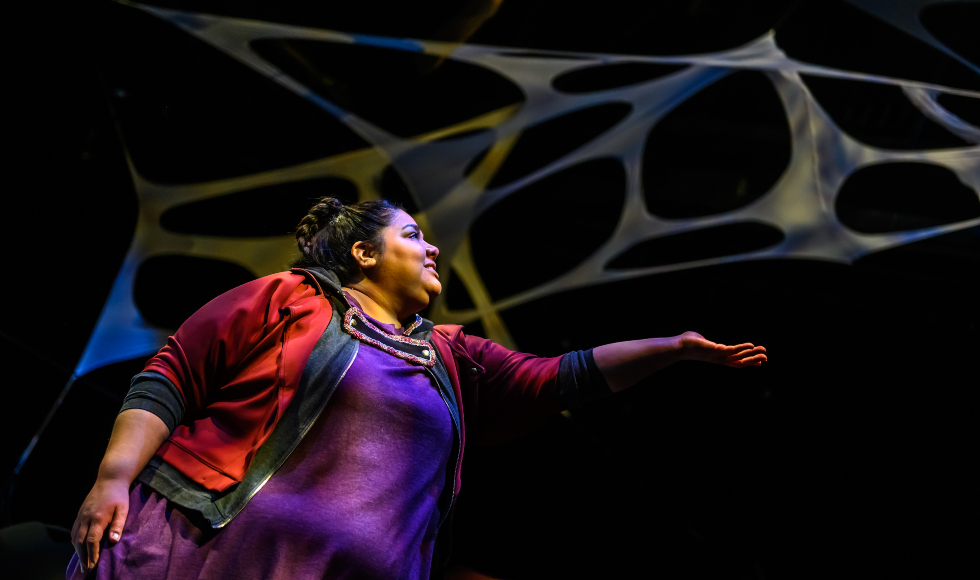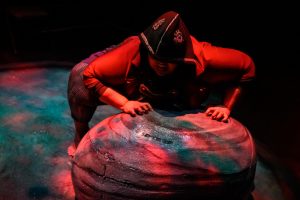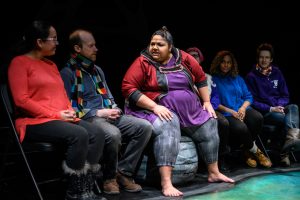Performing – and witnessing – the impact of intergenerational trauma

Yolanda Bonnell as The Girl in her solo play, bug, which will be screened virtually on Nov. 26. Photo by Dahlia Katz
When playwright and artist Yolanda Bonnell was in her first year at Humber College’s theatre school, she got the word “bug” stuck in her head.
“I was walking to school and I saw a bug crawling across a sidewalk – and I started wondering how aware it was of its surroundings, and does it know that it could be stepped on at any moment?” she explains.
“My mind started going to the way people react around bugs, and I thought, ‘Bug is a really good word’ – it can mean so many things: to be bugged by something, a bug being planted, a bug in a code. There were so many places it could go.”
She held on to that image until her third year, when the word took on a deeper, more troubling meaning as Bonnell began writing a solo show from the perspective of creature who was the embodiment of the traumas, addictions and struggles faced by Indigenous women. Eventually, that creature would become known as Manidoons – the Ojibwe word for bug.
“The fear and treatment of bugs and insects and the fear and treatment of Indigenous women are the same,” says Bonnell, who is Ojibwe and South Asian, and is from Fort William First Nation in Thunder Bay. “That was the driving force behind naming the play bug.”
A pandemic-friendly virtual screening
That third-year solo show at Humber eventually became a full-length play – and now, McMaster’s Gender Studies and Feminist Research (GSFR) graduate program, along with the School of the Arts and the Indigenous Studies program, is presenting a free virtual screening of bug and a post-performance talkback on Nov. 26.
bug follows the story of a young Indigenous girl through the foster care system, into motherhood and eventual struggles with addiction as she and other characters, including her mother and Manidoons, grapple with the impact of intergenerational trauma.

Directed by Cole Alvis, one of the School of the Arts’ artists-in-residence this term, and originally commissioned for Toronto’s Luminato Festival in 2018, bug was part of Theatre Passe Muraille’s 2020 pre-pandemic season and nominated for four 2019 Dora awards.
When the COVID-19 pandemic shuttered live theatre, bug adapted too, premiering a filmed version, directed by Métis filmmaker Jessica Lea Fleming, at the FemFest play festival in Winnipeg.
“It’s an incredible opportunity to have Yolanda and Cole visit campus virtually,” says Peter Cockett of the School of the Arts’ Theatre and Film Studies program.
“The production is such a powerful example of devised theatre, of what is possible when theatre artists collaboratively engage with the social and political realities they face. The staging is exciting and imaginative, and Yolanda’s writing and performance are deeply moving.”
Creating a connection
The virtual event won’t just be a passive experience for observers, says Melinda Gough, a theatre historian and professor in the GSFR program. Like the live performances, the witnesses to the play are an integral part of the life of the piece.
“We want an event where people are talking to each other,” Gough explains. “That seems particularly important for something like bug – part of the point of theatre is to open up conversations and create and foster community. There’s something that happens when we’re all together. Even if we’re not in the same room, there’s a temporal coming together.”
With the challenges of the pandemic, that sense of community is more important now than ever, says Adrianne Xavier, the acting director of the Indigenous Studies program.
“We need to be able to feel that connection, whether digitally or not, and know that it’s there,” she says. “Let’s be purposeful – we’re going to move forward in time, and time doesn’t care about the pandemic. The knowledge and the connection that this kind of presentation creates is something that a lot of people can benefit from.”
Supporting the witnesses
Because the subject matter in bug has the potential to be disturbing, there are several supports in place for people who may need to talk. Kathy Knott, an Elder-in-residence at McMaster, will be present for the event, and Indigenous audience members who would like further support will also be directed to the Hope for Wellness Help Line, which offers crisis intervention and counselling and is staffed 24/7. Indigenous students who may need to speak with someone after the event are invited to contact Andrew Nussey, an Indigenous counsellor with Indigenous Student Services.
For manidoons collective, the performing arts group led by Alvis and Bonnell, a sense of responsibility for the safety of the audience is an integral part of the play.
“I fully believe that it’s our responsibility as artists to take care of our witnesses,” Bonnell says. “I want to make sure that when I’m telling the story people feel a real connection to it, and that might cause an emotional response. It feels like our responsibility to care for them in those moments.”

Along with an Elder, there will also be a chance to ask questions and chat with Bonnell and Alvis after the performance. As well, Bonnell and Alvis held a virtual storytelling workshop with Indigenous women, Two-Spirit and non-binary participants a few days before the screening. Participants, who were guided to create their own creation stories, will be invited to perform their works before bug is screened.
“That educational component is important – that we’re there with the audience to decompress,” says Alvis, who is a Two-Spirit Michif artist with Métis-Chippewa and Irish-English ancestors. “From there, we hope that the witnesses take that teaching into the world – there’s a responsibility to share that knowledge.”
That act of sharing knowledge – rather than simply passively consuming a theatre production – is key to ensuring that the experience of bug lives beyond its performance, says Bonnell – and that is crucial, because, while bug is a piece of theatre, it expresses deep truths about the experiences of Indigenous women.
“We’re watching bug in a heightened form of text and movement in a theatre setting – but those people exist,” says Bonnell. “They exist in all their complexities and traumas, but also all of their joys, and love, and laughter and care as well. All of those things are true at once.”
bug is written and performed by Yolanda Bonnell and directed by Cole Alvis
Nov. 26, 2020, 7-9 p.m.
To attend this free performance and talkback session, please register at Eventbrite
Presented virtually by McMaster’s Gender Studies and Feminist Research graduate program, the Indigenous Studies program, and the School of the Arts.

